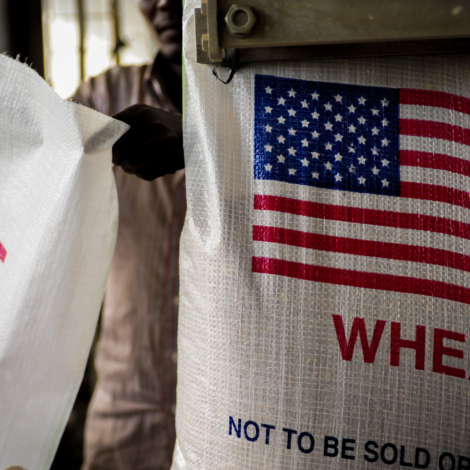Thousands of contractors are laid off in the United States and abroad, and global aid organizations are cut from previously reliable grants following the freeze on USAID funds. The impacts may be felt hardest in countries where USAID and its partners operate. The Engineering for Change community and the larger global sustainable development sector are struggling to understand the repercussions and next steps.
“The longer-term impacts will include significant displacements, disease and likely many deaths” – Dr. Evan Thomas, University of Colorado Boulder
On January 20th, the US President Donald Trump issued an executive order that froze the agency’s funding for 90 days. It may never recover. There is discussion of folding what survives of the agency into the US State Department. USAID is the US government’s primary aid organization that has commanded much of the country’s aid budget, roughly $40 billion annually in recent years. The United States spends more on foreign aid than any other country (although it spends a lower share of its GDP on foreign aid than other developed nations), and much of that money is spent in collaboration with other organizations throughout the world. The effects of the freeze are rippling through the global aid community.
Sub-Saharan Africa may be among the hardest hit. In recent years, USAID spent roughly $8 billion each year in the region, 70 percent of which went to health programs dominated by HIV/AIDS assistance. In South Africa, patients have found locked doors at HIV clinics supported by a US health program that has been key to curbing the global AIDS epidemic.
“The implications for the most vulnerable people in the world are already apparent – food relief, drinking water supplies, medicine, medical services, refugee camps have already either been suspended or severely undermined. The longer-term impacts will include significant displacements, disease and likely many deaths,” Dr. Evan Thomas, Director of the Mortenson Center in Global Engineering and Resilience at the University of Colorado Boulder, wrote in a LinkedIn post that E4C has permission to cite.
Job losses and confusion
“This is an extinction-level event,” for US foreign aid, Wayan Vota told E4C, repeating a phrase he wrote on LinkedIn. Following the funding freeze, Mr. Vota was laid off from his new position in digital transformation at Humentum. He is one of 8,850 Americans who have lost their jobs, as confirmed by USAID Stop-Work. The site, collecting data and stories of the impact of the closure, estimates that more than 50,000 Americans have lost their jobs so far. Globally, USAID Stop-Work has confirmed more than 10,000 jobs lost and estimates there may be more than 100,000 lost. Mr. Vota believes the American job loss total could climb to 100,000 in the coming weeks.
“This is an extinction-level event” – Wayan Vota
Mr. Vota has listed some of the international development organizations that have laid people off. Those who have lost their jobs sent confirmation and he has verified more than 20 to date. The list is a kind of snapshot of the sector’s misery, but at the same time it’s an attempt to normalize the experience of job loss that can feel shameful.
E4C’s networks are clogged with stories from global development practitioners who are laid off, or fear the imminent loss of their jobs or funding. There is confusion about the cuts and what might remain if some funding is ever restored. Our own work at E4C has also been affected by the freeze of funding for an energy project we were collaborating on.
Resiliency
People seem afraid to go on record to share their stories, but we have collected a few comments from people in countries where USAID operates. On a LinkedIn post and the USAID Malawi Facebook page, the themes have been resilience, trust in a higher power and the need for self-sufficiency.
“The Executive order reminds those in humanitarian service to have considered resilience, building of local organizations to have independence and modalities to mobilize funds on their own,” Ekiru Dennis, who works in WASH systems and disaster management in Lodwar, Kenya, wrote on LinkedIn.
What’s next
The pace and magnitude of the situation has sown fear and confusion, but gaining understanding is a solid first step. Share your experiences. Use our platform here and our Linkedin page. We’re soliciting ideas for solutions and next steps.and we are publishing about platforms, movements and ideas that seem promising.
Tech Change is attempting to quell some of the uncertainty with a platform that documents the impact: GlobalAidFreeze.com.
“By collecting data and stories from those directly affected, we aim to build a clearer picture of the outcomes and make this information accessible for analysis and advocacy,” a writer for Tech Change wrote on ICTWorks.
USAID Stop-Work is also gathering data, and it offers rally information, a petition, statistics, stories and talking points about the agency’s value.
Mr. Vota’s advice to US global development practitioners is to consider looking for work in another sector. To help, he launched a newsletter called The Career Pivot.
“I fully believe that we’re all going to need to get new jobs,” Mr. Vota says. “And I’m including myself in this. I want to be really clear. I am in trauma, just like everybody else. I’m laid off like everybody else. I created The Career Pivot as a way for us as a community to process our loss and figure out a way to get new jobs.”
And join a community of like-minded engineers and technical professionals working in sustainable development. If you’re not an E4C member, register now. Our work together is as important as ever.


Since its inception USAID has worked hand-in-glove with the CIA (and other orgs like the National Endowment for Democracy) at US imperial projects in regime change. It’s not “AID” as in “help.” It’s the US Agency for Imperial Domination. It’s the contemporary version of colonialism. USAID should be abolished. I’m not pro-Trump or pro-Elon, but if they can hack away at the evil that is USAID then good for them…
USAID has been a major contributor to the war in Ukraine at least since the 2014 coup and has supported Nazi-aligned elements there such as the Azov Battalion. It has also supported ISIS and al Qaeda in Syria. Additionally, it has funded gain-of-function (covid) viral research in collaboration with US universities, the EcoHealth Alliance NGO run by Peter Daszak, and the Wuhan Institute of Virology. What does Univ of CO Prof. Ethan Thomas have to say about this?